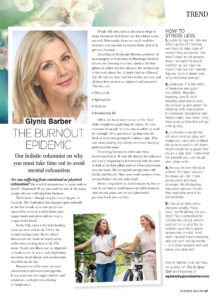Are you suffering from emotional or physical exhaustion? Do you feel unconnected to your work or family? Depressed?
You could be one of the many people who are suffering from burnout
Work stress is thought to play a very big part in burnout. The work place has changed quite radically in the last decade or so and people are expected to work at a much faster pace, longer hours and often without even a proper lunch break.
In the UK, work is the third leading cause of stress and in the US it’s the second leading cause. Stress-related illnesses are the cause of nearly seven million lost working days in the UK alone. Nearly any illness can be triggered or made worse by stress, with depression, insomnia, heart disease and autoimmune disorders on the rise.
Burnout can affect your memory, concentration and even your appetite
It can make you feel angry, irritable and pessimistic, and give you a feeling of helplessness.
People will often turn to alcohol or drugs to make themselves feel better but this seldom works out well. Fortunately, there are much healthier measures you can take to recover from, and even prevent, burnout.
According to Dr Joseph Maroon, professor of neurosurgery at University of Pittsburgh Medical Center, the first step is to take a look at the four pillars on which our lives depend. He outlines this in his book Square One: A Simple Guide to a Balanced Life. He says we have four lives to live, not one, and all these lives need to be balanced and nurtured. The lives are:
- Physical life
- Spiritual life
- Work life
- Relationship life
Often, we focus more on one of the ‘lives’ while completely neglecting the others. It’s very common for people to focus almost solely on work for example. It’s a question of getting your life back in order and getting the balance right. This can mean making big changes and even changing professions for some.
Preventing burnout is a lot easier than recovering from it
If your life doesn’t feel balanced and you’re beginning to feel stressed, take the time to look at the four pillars and see what adjustments you can make. Do you spend enough time with family and friends? Does your work continue when you get home? Do you truly relax?
Stress is impossible to avoid completely, but we can do our best to avoid known stressful situations. And we can make sure we add pleasurable pastimes back into our lives.
How to stress less
- Learn to say no. We are often guilty of thinking we have to take care of everything We don’t want to let people down or want to avoid conflict so we take on more than we can handle. Saying no is a great way of preserving energy.
- Exercise. The benefits of exercise are quite incredible. Besides keeping you fit and healthy, exercise is very de-stressing and great for helping with depression It increases dopamine and helps make new brain cells. And even a little bit will go a long way.
- Cultivate a social life. All work and no play will make you very dull indeed. Be sure to switch off from work mode for a good few hours a day and make time for people you can laugh and relax with.
- Focus on one thing at a time. It’s been proven to make you far more productive and less stressed. Multi-tasking has been proven to do the opposite and is to be avoided.
- Use your electronic devices wisely. Mute your notifications, so you don’t feel compelled to constantly check what’s just come in, and try to restrict your time spent answering And don’t spend hours messing around with social media– it is time wasted and will leave you drained.

